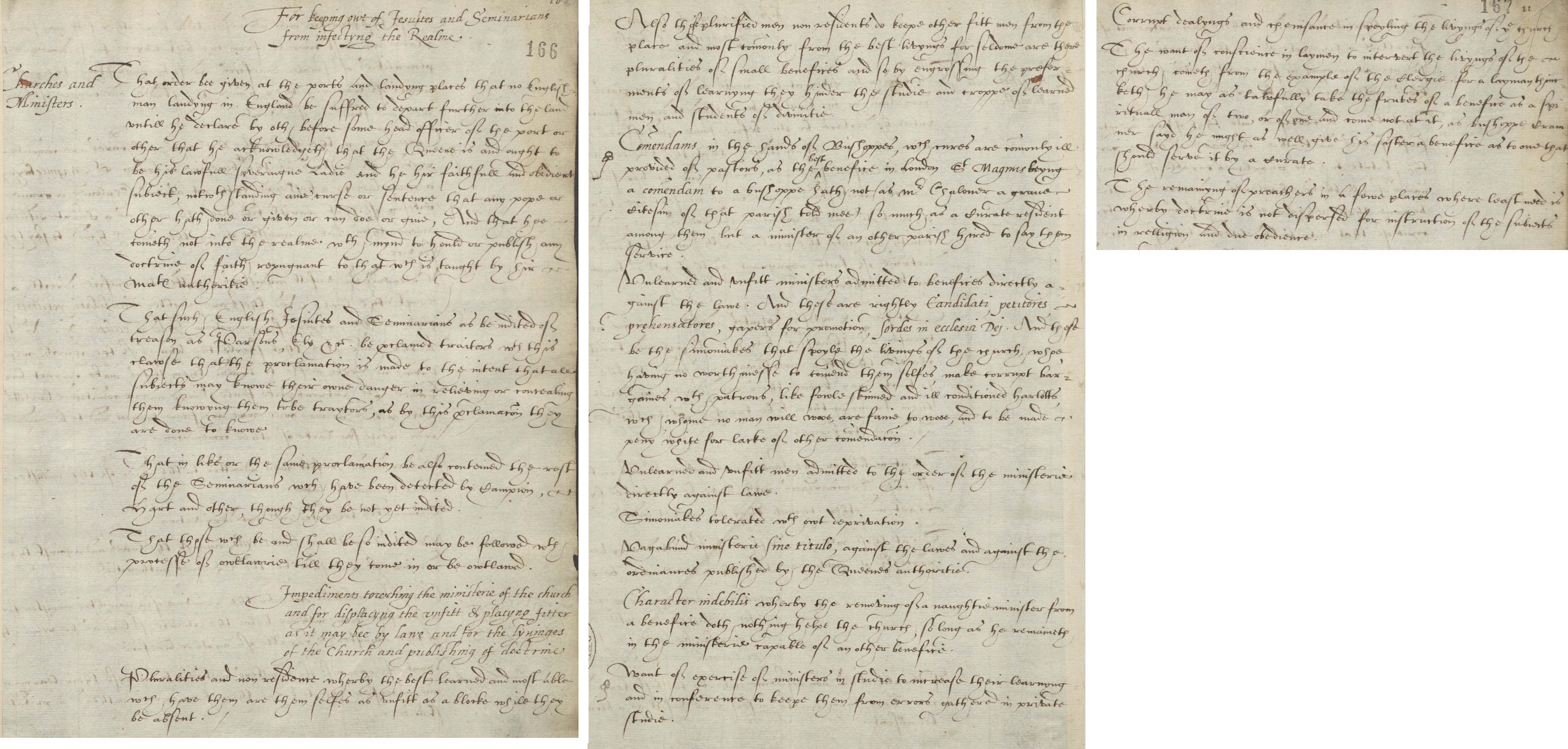
Extract from a ‘Book of Devises’ on religion by Thomas Norton, March 1585 (SP12/177/59, f.166r-167r)
Thomas Norton was an Alderman of London, an MP, a lawyer and one of the council’s ‘men of business’: someone who helped them manage business in the House of Commons and wrote position papers. This extract from the lengthy ‘Book of Devises’ on religion provides a different perspective on the problem posed by English Catholics compared to the letter by Trafford and Worsley. Norton sees part of the problem lying with the Catholics, Jesuits [Society of Jesus, a Roman Catholic order of priests founded by St Ignatius Loyola, St Francis Xavier, and others in 1534, to do missionary work] and seminary priests, but puts a great deal of emphasis on the faults of the Elizabethan church itself.
Transcript
[f.166r]
For keeping out of Jesuits and Seminarians from infecting the Realm
[In the margin: Churches and Ministers]
That order be given at the ports and landing places that no English man landing in England be suffered to depart further into the land until he declare by oath before some head officer of the port or other that he acknowledges that the Queen is and ought to be his lawful sovereign Lady and he her faithful and obedient subject, notwithstanding any curse or sentence that any pope or other hath done or given or can do or give, and that he cometh not into the realm with mind to hold or publish any doctrine of faith repugnant to that which is taught by her Majesty’s authority.
That such English Jesuits and Seminarians [men training at theological college to become Catholic priests] as be indicted of treason as Parson, Ely etc. be proclaimed traitors with this clause that the proclamation is made to the intent that all subjects may know their own danger in relieving or concealing them knowing them to be traitors, as by this proclamation they are done to know
That in like or the same proclamation be also contained the rest of the seminarians which have been detected by Campion, Hart and other though they be not yet indicted.
That those which be and shall be so indicted may be followed with process of outlawry till they come in or be outlawed.
Impediments touching the ministry of the church and for displacing the unfit & placing fitter as it may be by law and for the livings of the Church and publishing of doctrines
Pluralities and non-residence where by the best learned and most able which have them are themselves as unfit as a block while they be absent.
[f.166v]
Also this [these] plurified [men holding more than one office] men non- residents do keep other fit men from the place and most commonly from the best livings for seldom are there pluralities of small benefices [church livings] and so by engrossing the preferment [promotions in office] of learning they hinder the study of croppe of learned men and students of divinity.
Commendames[1] in the hands of Bishops, which cures are commonly ill provided of pastors, as the best benefices in London St Magnus [St Magnus the Martyr] being a commendam to a bishop hath not (as Mr Chaloner a grave citizen of that parish told me) so much as a curate resident among them but a minister of an other parish hired to say them service.
Unlearned and unfit ministers admitted to benefices directly against the law. And these are rightly candidati, petitores, prehensatores,[2] gapers for promotion, sordes in ecclesia Dej [‘Filth in the church of God’]. And these having no worthiness to commend themselves, make corrupt bargains with patrons, like foul skinned and ill conditioned harlots, which whom no man will woo, are fain to woo, and to be made penny white for lack of other commendation.
Unlearned and unfit men admitted to the order of the ministry directly against law.
Simoniacs [those who buy and sell church offices] tolerated without deprivation [punishment].
Vagabond ministry sine titulo [without title] against the laws and against the ordinances published by the Queen’s authority.
Character indebilis [indelible character] whereby the removing of a naughty minister from a benefice doth nothing help the church, so long as he remains in the ministry capable of another benefice [living].
Want of exercise of ministers in study to increase their learning and in conference to keep them from errors gathered in private study.
[f.167r]
Corrupt dealings and [unclear] in spoiling the livings of the church. The want of conscience in laymen to intervert [to put to another use than the one intended] the livings of the church comes from the example of the clergy, for a layman thinks he may as lawfully take the fruits of a benefices as a spiritual man of two or of one and come not at it, as bishop Cranmer said he might as well give his sister a benefice as to one that should serve it by a curate.
The remaining of preachers in a few places where least need is whereby doctrine is not dispersed for instruction of the subjects in religion and due obedience
[1] Commendams: livings that were either given by a patron (usually a bishop) to someone on a temporary basis until a preferred candidates was available or, more usually, given to a layman or clerk so that they could take the income of the benefice.
[2] This list does not refer to specific positions or types of people: all three mean ‘candidates’
